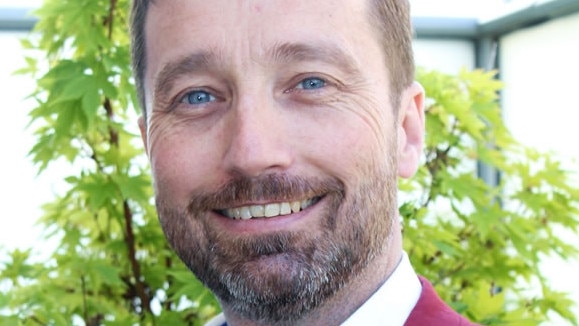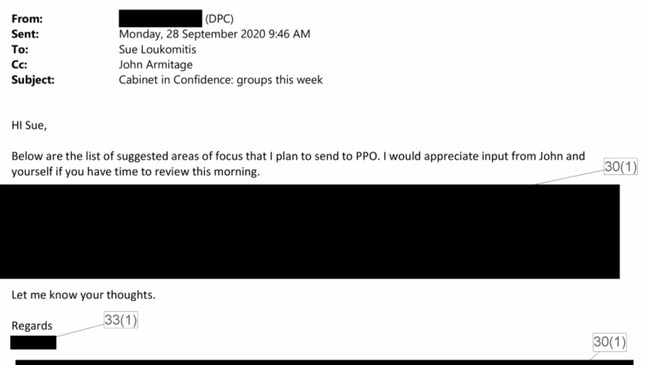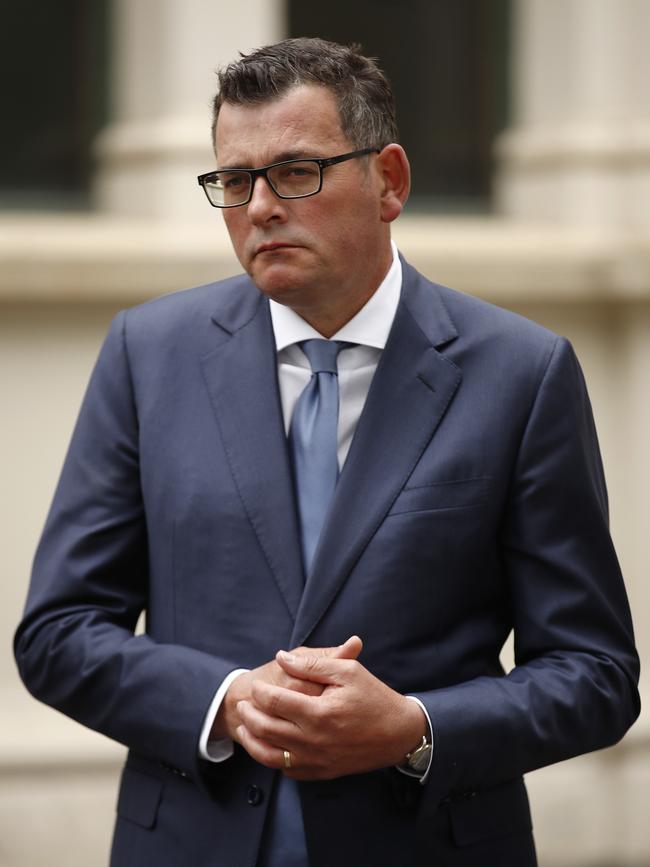The secret virus surveys by Daniel Andrews’ spin doctor John Armitage
As Melbourne plunged into a 112-day lockdown last July, the Premier’s $2m political strategist embarked on a massive survey to monitor community reaction.

Dan Andrews’ $2m political strategist embarked on a large-scale program at the height of last year’s Covid-19 crisis to monitor Victorians’ reaction to lockdown restrictions and score the government’s performance out of 10, including its leadership, in tackling the pandemic.
The Australian has obtained hundreds of pages of Andrews government documents and emails — many marked “cabinet in confidence” — revealing that as the state’s second wave broke and five million Melburnians entered a 112-day lockdown in July, the government ordered taxpayer-funded research firm QDOS to conduct extensive community surveys to assess the political impact of the restrictions.
The fortnightly surveys run by QDOS chief and Labor strategist John Armitage – who promotes his company’s expertise in “changing public opinion” – suggest that as the Premier stressed the hard lockdown with its 5km travel limit was guided by health advice, his government was also sensitive to potential political fallout from the measures. Victorians were asked to rate the government’s overall performance “in response to the coronavirus outbreak”.
The surveys asked Victorians to score the government from 0 to 10 on “providing leadership during the coronavirus outbreak” and rate its performance on “acting on advice from health officials”.
Victorians were asked if they thought the restrictions had been “much too soft, too soft, about right, too harsh, much too harsh”, and if “you are more concerned about the coronavirus impact on health and society OR its impact on jobs and the economy”.
The fourth survey round, conducted in the second half of July, asked Victorians: “On Monday 6 July, the Premier announced that people … would go back into lockdown for six weeks (stage 3 restrictions) to control a spike in coronavirus cases. Do you think this will be effective in containing coronavirus?” They were asked to record a score between 0 and 10.
Other questions were focused on public health to test community attitudes to washing hands, getting tested, working from home, remote learning and support for workers and businesses.
The emails and documents were released to The Australian under Freedom of Information laws. Many were heavily redacted and the results of the surveys were kept confidential.
The secret coronavirus survey results were among more than 1800 pages of data capturing the views of Victorians about Andrews government policies and the state’s direction generated by QDOS in 2020.
The trove of confidential data recording the opinions and mood of voters, including their reaction to Covid-19, has been blocked from public release despite being publicly funded.
‘We squeeze opinion’
The Department of Premier and Cabinet revealed the existence of the mammoth dump of 1800 pages of raw survey data in response to The Australian’s FOI request for communication records between QDOS and the DPC, Mr Andrews and his chief-of-staff, Lissie Ratcliff, in 2019-20.
Mr Armitage’s company promotes its expertise in “changing public opinion”, claims on its website “public opinion is a fluid thing that we can squeeze, pump and stir” and boasts “the tricky bit is figuring out how to change what they think and how they behave”.
In October, The Australian revealed Mr Armitage’s firm had been paid more than $2m in taxpayers’ funds since 2016 to run the highly classified program monitoring the views of Victorians for Mr Andrews.
In rejecting the request to publicly release the data, the department confirmed excel spreadsheets with “significant volumes of raw survey data” had been identified.
“The spreadsheets alone are over 1800 pages,” the department said.

When asked late last year about Mr Armitage, the Premier described his work as “important” but “not political”, and confirmed the QDOS reports were classified cabinet-in-confidence and would never be released.
The Premier’s office failed to respond to a series of detailed questions from The Australian on Monday, instead releasing a brief statement. “All governments around Australia – federal and state, Labor and Liberal – seek community feedback to gauge how to best deliver services,” a government spokesman said.
Mr Armitage did not respond to detailed questions.
QDOS and government emails confirm both the Department of Premier and Cabinet and the Premier’s private office were heavily involved in framing questions and choosing the timing, location and ages of those surveyed. The surveys used focus groups, online polls and telephone interviews.
Sixty-four documents were identified as being relevant to The Australian’s FOI request with 57 released, although many were heavily or sometimes completely redacted, while seven documents were kept totally under wraps.
Among reasons for the redactions and rejections were that they were an official record of deliberation and decisions by cabinet and had been prepared by a minister. Some draft documents were not released, with the FOI officer saying doing so could “cause confusion and ill-informed debate”.
Email exchange
Most of the emails were either sent or received by QDOS research director Sue Loukomitis.
One exchange on September 15 between Ms Loukomitis and a DPC manager, whose identity has been redacted, reveals the key involvement of the Premier’s private office and the DPC in the forensic planning of a survey to coincide with an expected lockdown easing.
At 9.28am, the DPC manager emails Ms Loukomitis, stating; “Thanks Sue, We might be able to space the rounds out a bit based on the dates for each Step. I will have a look at the road map today and see when it would be sensible to be in the field.”

At 11.29am, Ms Loukomitis responds: “Maybe keep in mind there have already been some shifts in what can open in metro Melbourne (beauty and gyms in a restricted capacity have been moved forward to 26 Oct I think?) and it might be useful to have either the survey or groups a bit more frequent. Will be interesting to compare the current survey round to the next one given the opening up of regional Victoria.”
At 3.32pm, the DPC manager emails the QDOS research director back, writing; “Please see below for the options I’ve provided to PPO (Premier’s private office) – follow up tomorrow.
“My preference is to go with Option 2. Not sure we will learn anything new if we go before the 28th unless we know for sure that there will be an announcement prior to this date.
“Suggested suburbs – Narre Warren (or Pakenham) and Sale (or Ballarat) – let us know if there is a preference, we haven’t been to any of these areas this year.
“Please let us know if you have a preference on dates, is there a need to go prior to the next key date for metro on the 28th Sept?”
At 3.34pm, Ms Loukomitis responds: “Option 2 only pushes it out by a week and is straight after the next milestone, so that looks OK to me.”
On Monday, September 20, at 9.46am, in an email tagged “cabinet in confidence”, the DPC manager emails Ms Loukomitis, saying: “Below are the list of suggested areas of focus that I plan to send to PPO. I would appreciate input from John (Armitage) and yourself if you have time to review this morning.”
A “discussion guide” for these focus groups has been released under FOI.
It suggests the government was focused on assessing the level of frustration in the community to the marathon lockdown.
“Pulse check — expected/unexpected, extent of resignation/frustration.
“Why has the government taken this approach?
“Do you understand the need to get the numbers as low as possible to avoid a ‘third wave’/cases rising again?
“Do you link the need to control the virus before the State Government can address jobs and the impact on the economy?
“Once cases are lower and restrictions ease further, do you have confidence that contact tracing and health response will keep numbers low?”
Household moods
For Narre Warren residents, the guide highlights the government was keen to tap the mood about the curfew, outdoor gathering limits and the resumption of school.
The survey, according to the guide, was focused on the mood and hope within households, and asked: “What changes to restrictions would make the biggest impact for your household and family in the coming weeks/months.”
Under a section headlined “Victoria’s direction”, the guide states: “Do you compare Victoria’s to other stated/NZ/other countries?
“With coronavirus cases declining (over 700 daily 6-7 weeks ago to under 20 now), how do you think the government has managed the situation? In hindsight, what could have been done differently by government, communities, individuals?”
On September 29, Ms Loukomitis emails the DPC manager, saying: “If PPO wishes to add anything to this list, please let us know by around midday tomorrow.”
At 11.48am, on October 1, Ms Loukomitis emails a DPC manager about the focus groups in Ballarat. The manager’s name has been redacted from the email, as have the critical observations.
“Below are John’s (Armitage) main take outs from last night’s groups in Ballarat. Apologies they aren’t in a separate memo; we have several groups starting tonight that have a fair bit of technical content, so need to make them understandable! We will get you the full report early next week, including our observations of any frustration implications on actually breaching the rules.”




To join the conversation, please log in. Don't have an account? Register
Join the conversation, you are commenting as Logout